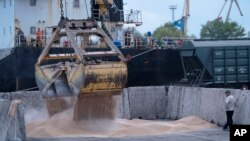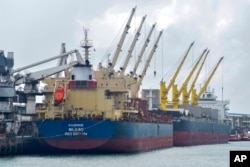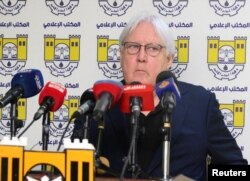A senior U.N. official said Friday that despite discouraging remarks from Moscow, the United Nations is continuing to pursue an extension of the deal that allows the safe export of grain from Ukraine via the Black Sea.
"We hear repeated statements from the Russian Federation, saying that there's been no advantage to them and time's up," U.N. humanitarian chief Martin Griffiths told reporters of the grain deal. "But of course, as the [U.N.] Secretary-General has made clear, this doesn't deter us from doing everything we can to work for renewal."
The Black Sea Grain Initiative is due for renewal on July 18. Moscow has said repeatedly during the lead-up to previous extension deadlines that it is not benefiting enough under the deal.
A parallel memorandum of understanding between Moscow and the United Nations has sought to remove obstacles to the export of Russian grain and fertilizer. While food and fertilizer are not sanctioned by the West, efforts have been made to ease concerns of anxious banks, insurers, shippers and other private sector actors about doing business with Russia.
Since the grain deal was signed in Istanbul on July 22, 2022, nearly 33 million metric tons of grain and other foodstuffs have been exported to global markets, helping to ease food prices, which spiked at the start of Russia's full-scale invasion of Ukraine in February last year.
"The world has seen the value of the Black Sea initiative," Griffiths said. "This isn't something you chuck away."
But exports have slowed significantly since May, as ship inspections and registrations dropped dramatically. Diplomats have previously blamed Russia for slowing inspections and registrations.
The U.N. said last week that no new ships have been registered to transit the Black Sea since June 26 at the Joint Coordination Center in Istanbul, which oversees the deal. Russia, Ukraine, Turkey and the U.N. have representatives at the JCC.
"It's very clear that there has been a complete slowdown. It's not hidden," Griffiths said. "It's about in the JCC in Istanbul, one party saying that we cannot in all conscience start processing ships into this, if we don't know that they will get out of it before the 18th of July, and that's the reason for it."
Ukrainian President Volodymyr Zelenskyy was in Turkey on Friday, where he met with President Recep Tayyip Erdogan and the two discussed the grain deal, among other issues. Erdogan was instrumental in achieving the deal nearly a year ago.
Damaged pipeline
Russia and Ukraine have blamed each other for damage caused to a section of an ammonia pipeline last month in Ukraine's Kharkiv region. The pipeline runs from the Russian city of Tolyatti to the Ukrainian port of Odesa.
Griffiths said the pipeline is damaged in three places and that the U.N. has offered to send a technical team to assess what repairs are needed but has not received the guarantees it needs to do so.
"It's a very active war zone, and that's why it was damaged, in our opinion," he said of the pipeline. "To get to those three places to assess damage already requires a certain amount of agreement between the parties to provide a safe 'window of silence' to allow you to get there."
With the clock ticking on the grain deal and harvest season around the corner, Griffiths says he is eager to sit down with the parties in Istanbul next week, and his colleague, U.N. trade chief Rebeca Grynspan, would like to go to Moscow where she has led negotiations.
Pressed by reporters about whether the deal will end if Russia refuses a renewal, Griffiths said it is not for him to say but that he would expect active support from the United States and European Union, which is critical to removing impediments to Russian exports, to quickly fade if Moscow ends its participation.






